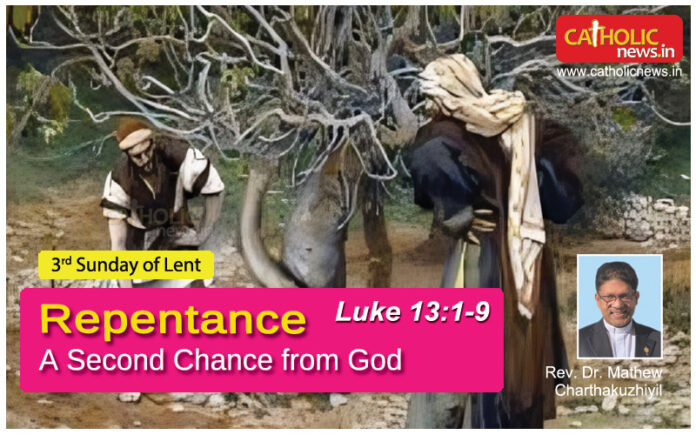
The Gospel reading today begins with the description of two tragic incidents. Pilate ordered the killing of several Galileans and mixed their blood with the sacrifices of the Temple, and then a tower collapsed in Siloam, killing many people. In ancient times, and even today, people often see such disasters as a form of divine punishment. However, Jesus corrects this view. He does not portray God as a God of retribution but instead invites the people to repentance. He shifts the focus from blaming God for suffering to a call for personal conversion.
Humanity takes pride in its progress, boasting of advancements in science and technology. Yet despite all these achievements, the world is still plagued by violence and suffering. Constant wars and countless conflicts around the world remind us of the deep wounds caused by human greed, power struggles, and indifference. Rather than seeking vengeance, God calls us to work for peace and reconciliation. He does not desire destruction but rather that we turn our hearts toward him. The call to repentance is not one of fear but of renewal and transformation.
In the second part of today’s Gospel, Jesus presents the parable of a barren fig tree planted in a vineyard. The owner, seeing that it has borne no fruit for three years, tells the gardener to cut it down. However, the gardener pleads for another year, promising to tend to the tree with special care in the hope that it will finally bear fruit. This parable is a powerful reminder that God is patient with us. He grants us time—time to change, time to bear fruit, time to return to him. Each Lent is another opportunity to reflect on our lives and embrace the call to repentance.
To illustrate this message, let us consider the story of a sculptor named Michelangelo. One day, he was seen working tirelessly on a large block of marble. A passerby asked what he was doing, and he replied, “There is an angel trapped inside this stone, and I am chipping away everything that does not belong to it.” Michelangelo saw beauty and potential where others only saw an unshaped rock. With patience and skill, he removed every unnecessary piece to reveal the masterpiece within.
This is how God sees us. We may feel like unshaped stone, burdened by sin, fear, or complacency, but God sees the masterpiece within us. He patiently works to remove the barriers that prevent us from becoming who we are meant to be. Yet, unlike a block of marble, we are not passive in this process. We must actively cooperate with God’s grace. The barren fig tree in today’s parable was given another chance, but it still had to bear fruit. Likewise, we are given time, but we must use it wisely.
Too often, our Christian communities grow comfortable and passive. We enjoy the traditions, prayers, and stories of faith, yet we hesitate to step out of our comfort zones and truly live the Gospel. But if we want God to shape us, like Michelangelo shaping the marble, we must be willing to let go of what holds us back.
This Lent, let us reflect: Are we bearing fruit in our lives? Are we open to God’s transformation? Or are we simply going through the motions of faith without real change? God is patient, but time is precious. Let us use this season of Lent as an opportunity to turn back to God, to allow Him to shape us, and to truly live our faith in action.
Rev. Dr. Mathew Charthakuzhiyil



